- Home
- catt dahman
Titanic 1912: A Lovecraft Mythos Novel Page 2
Titanic 1912: A Lovecraft Mythos Novel Read online
Page 2
“It’s beautiful,” Jenny said, as they toured the ship. She tried to behave lady-like but knew her father felt high society was a passing ideal whereas hard work, character, and determination were forever. Had he not said that a million times?
Jenny’s mother died in childbirth, and although Jenny wished her mother had lived and raised her, too, she knew that Peter Cavendar was an amazing father. He had given her this gift: to enjoy the grandest ship in the world.
Everywhere she looked, no expense was spared to make the décor as beautiful and elegant as possible. There was fine, polished oak paneling, huge windows along A Deck so that one felt a part of the seascape, and plush furniture, gleaming tables, couches, chairs, and lamps so plentiful that one only had to take a few steps to reach them.
The grand staircase, designed in a Louis XIV style and covered by seventeenth century William-and-Mary-style oak paneling was topped by a dome of wrought iron and glass so that light from the outside could shine in. It had gold plated light fixtures and bronze cherubs and ran all the way to E deck. Passengers often stood and gazed at it. The staircase was the heart of the ship.
Feeling like a princess, Jenny descended the stairs, one hand on her father’s elbow. It was the most elegant staircase she had ever seen.
“You need a crown,” Peter Cavendar said, reading her mind.
“Oh? Shall you buy me one set with emeralds and pearls? When I go out for a horse ride, I will make the other horses so envious.”
“Eh.” Mr. Cavendar groaned, as he smiled at his daughter.
Everywhere Jenny looked, there was something new and exciting. One of the dining rooms had trellises on the wall and wicker furniture with cushions of green and blue so it was reminiscent of an outdoor café in Paris. Mirrors and glass made the room twinkle as if with sunshine.
They toured for so long that instead of going to their staterooms, her father had to hurry them along to get prepared for dinner with the Captain. Jenny had time to wash her face and allow her maid to sweep her hair into an elaborate style with extensions, pins, and feathers to add height to the dark tresses.
She added a touch of rouge to her cheeks, and over her undergarments, dressed in chiffon, a green gown that was embroidered with green beading at the neck, hemline, and wrists. It had an under-lining of emerald green that flounced up in the back.
“You look lovely,” Peter Cavendar told her, “quite in fashion.”
“Not bad for a backwards girl from Texas?”
“You are every bit fashionable because I paid for it,” Peter laughed. He had the money, and he did not begrudge his daughter a single cent he spent, but the trunks of Parisian gowns had been very costly.
He did not know how a piece of fabric, netting, and a feather could be so expensive, but seeing them on his daughter and knowing how pleased she was with her image gave him pride. Luckily, next month, the gowns would be forgotten, and she would want a new saddle or boots.
As her father escorted her into the dining room, Jenny felt all eyes on her and knew this was a moment like one she would never have again. The room was over a hundred feet long and the width of the ship, furnished in Jacobean style with the furniture of honey-oak and the décor fashioned after the style of Hatfield, England.
A steward met them and escorted them to their seats. At the Captain’s table, she sat across from her father with a gentleman named Howard, to her left and a gentleman named John at her right. Both stood and introduced themselves.
The Captain entered the dining hall, and conversations quieted to whispers as every eye followed his movements.
For a second, he stood and allowed them to capture the moment of the Captain joining the first dinner of the maiden voyage. He looked around, and each person felt he personally had been welcomed. Captain Smith joined those at his table, after surrendering his hat to a steward, introducing himself again, and taking his seat at the head of the table.
Jenny was so overwhelmed that her hands shook. The shaking was so bad that she could hardly manage a bite of the appetizer: a bowl of scallops with verdant herbs. The waiter filled each bowl of meat and greenery with a savory scented, creamy soup topped off with a tiny scoop of something red and a silver spoon.
“How impressive,” John remarked, “that they have used the scallop’s roe as decoration. See, those tiny beads. Take a bit of the scallop meat and broth with a few bits of the roe; it’s very delicious.” He showed Jenny and Howard.
Jenny tried it and nodded, “Yes, isn’t it lovely?” She was thankful her father explained the dishes as she hardly heard the Master of Ceremonies as he announced each dish. She was too overwhelmed to concentrate.
Each dish was formally announced, and the patrons chatted and praised each as it was served, making for a leisurely dinner.
Peter Cavendar motioned with his spoon, “Fertility, isn’t it? Doesn’t the scallop shell refer to that? I am trying to recall.” His Texas accent began more distinct as he drank spirits.
Maggie Brown laughed openly, as she appreciated his comment, quite veiled but a little naughty. She ate her soup with zeal. The British passengers pretended they did not hear the comment.
“I believe it refers also to Atlantis,” Howard said.
“Does it?” Peter asked.
Howard nodded, “And that’s a little worrisome, considering that the island ended up at the bottom of the sea, the inhabitants swallowed by beasts. In spite of all the brilliance of the culture and all the advances the men made, it all lies imbued with sea water and left to decay.”
“A mythical place,” Peter Cavendar asked, “of legends? Ah, you are the writer, yes? You know the legends of Atlantis?”
Howard shrugged and managed a blush, “I aim to be a writer, perhaps. My little poems have gotten a little notice, and I am working on more pieces, but I hope for inspiration on this journey. If you would care to read anything, I would be honored, Mr. Cavendar, Miss Cavendar, Mrs. Brown.”
Delora Philips leaned slightly across her nephew to speak to Jenny, “Oh, tell him no, or you shall end up feeling terribly bleak. He is so brilliant but has the propensity to be quite morbid.” She gave an exaggerated shudder and laughed. She was thrilled to notice he had offered to socialize, albeit with his writing.
“Why I’d be downright honored,” Maggie Brown declared, “as it is a grand opportunity to read the fledgling starts of a story. Perhaps we will all play parts in the drama as characters.”
“I hope not, Mrs. Brown, as it is a grievously frightening tale,” Howard said.
“All the more for me to want to be a part,” Mrs. Brown said, winning an appreciative smile from Howard.
Delora broke in to ask the Captain a question, changing the conversation before Howard could embark upon another dismal description of his work.
Howard was so talented but prone to dark moods just as his father had been. Delora often feared if they didn’t help Howard, he, too, might be hospitalized for anxiety.
Jenny barely picked at the other hors d’ourves, Oysters a la Russe, raw oysters, served with the top shells removed and the meat topped with a sauce of vodka, horseradish, lemon, tomatoes, salt, and sprinkled with coarsely ground black pepper. It was a wonderful dish, but there was so much food she feared her corset would pop if she ate more than a few bites of each course.
Several exclaimed over the dish, asking about the ingredients so they could have the dish prepared at home. Despite the courses that were to follow, many ate a half or full dozen of the oysters and sauce.
Next, was a tiny dish of poached salmon with a dollop of heavily whipped Mousselinesauce. Most were too excited by everything to eat much, but they tried a bite of each dish.
The next course was Filet Mignon Lili, topped with seared fois gras with truffles sitting on a bed of crispy potatoes and covered in a sauce of red wine. It was served with two other dishes, but everyone in the upcoming days spoke only of the beef dish.
“How does this steak compare with your beef, Mr. Cavenda
r?” The Captain asked. “Is it as flavorful?”
“It compares quite well, actually.” As guests looked to Peter Cavendar, he shrugged, “I have a few cows in Texas. We have a bit of a ranch there.”
Jenny almost swallowed her carrot whole as she suppressed an unladylike giggle. Her father referring to their ranch as “a bit” amused her to no end. He was undoubtedly one of the wealthiest men at this table and, as always, modest.
Maggie Brown caught Jenny’s glance and gave her a big wink so the women were able to share a secret joke. Jenny liked the woman already and hoped they would become good friends.
After lamb in a light mint sauce and roast duckling, they cleaned their palates with a sweet, tart lemony champagne mixture like candy. The main course was served: roasted squab with wilted watercress. Then, there was asparagus with saffron-champagne vinaigrette served with silver tongs, pasta, cheese, chocolate éclairs, Waldorf salad, peaches in Chartreuse Jelly, and coffee served by the waiters.
“Have you ever had a meal so fancy?” Jenny asked Howard and John, sitting on either side of her.
“I fear not. Captain, are all dinners this extravagant?”
“They are sumptuous and varied, but nothing compares to the maiden- night-voyage dinner,” he told Howard. He led them to stand and applaud the Master of Ceremonies and the Lead Chef.
Captain Smith tipped an imaginary hat all around, and said, “I must check on the bridge but will be in the Smoking Room as soon as I am able.”
As the men retired for cigars and brandy and the ladies went to their lounge for coffee, the Captain’s eyes twinkled as he suggested the younger people might enjoy a stroll that Mr. Murphy would lead along the ship’s boat deck.
“I hope you are including me in that invitation, Captain,” Maggie Brown smiled. She took Mr. Murphy’s arm, “I aim to be a younger person tonight.”
Mr. Murphy took this task seriously and wanted to provide answers to questions about the ship and her navigation and show off her finer points. He was proud to lead a special tour of the ship.
As they walked, Howard, Jenny, John, and a pretty red-haired young woman watched as some of the other cliques of young adults ran over to cheer and exclaim about the sea, seen from the boat deck in the evening. Stars twinkled, reflecting on the water’s surface.
“Do you ever miss living on land, Mr. Murphy?” Maggie asked.
“I do live on land; it’s just covered by a little water,” he chuckled. He already knew this was a woman he could jest with.
Murphy leaned against a railing while smoking a cigar and watching his young charges as Mrs. Brown asked questions about the ship and his service at sea. Personal maids ducked into shadows to watch and show propriety without interfering.
“Sixteen,” Murphy answered about the number of watertight bulkheads.
“And how many crew?” John asked.
“More’n eight hundred, Sir. The firemen work around the clock so we have lights and warmth.”
“And the pool is heated, yes? Is that common?”
Murphy told John that it was not, and this was the first line to have warmed pools. “And the Turkish baths are a Moroccan style. You will want to visit them.”
“Mr. William Stead?” Howard asked as he noticed a gentleman close to the rail, looking out onto the water. Mr. Murphy motioned the small group over so he could make introductions.
“I doubted I would find you aboard a ship,” Howard told Mr. Stead after shaking his hand. He was so thrilled to meet the man he could not wait to say itched told the others, “Mr. Stead is a wonderful writer.”
Stead laughed heartily, wiping his eyes, “Indeed? Thank you, but I am invited to a conference and will meet President Taft. How could I refuse? But ‘tis true that it is curious to find me here on this ship. I loathe ships.”
“Please tell us why, Sir,” Bernice, the red-haired girl begged, sensing a mystery and eager to delve into this one.
“Mr. Stead, besides being a journalist and well known writer, has written works concerning safety aboard ships and penned a tale of dismal trials taking place on an ocean liner that crashes into an iceberg,” Howard said.
“Ice? In the ocean?” Bernice asked as she laughed.
“Oh, it happens, to be sure,” Stead told them, “and more than you think. It is good we are aboard an unsinkable ship. We are perfectly safe, or I would not be here, but I did imagine the ice for the story I wrote.”
“I shall have to read it, Mr. Stead,” Jenny said, “for it sounds deliciously eerie.”
“Is there a copy aboard?” Maggie asked Officer Murphy.
“Ummm. On that question, you have me stumped.”
“And was the Captain not named Smith as well? I mean aboard the ill-fated one in your book?” Howard asked.
Stead nodded, “You are very well read, Sir. They did share the same name. Is this not a wonderful coincidence?”
“That makes me shiver. What vivid imaginations you both have,” Jenny said.
“How strange,” John said quietly, frowning slightly.
“Imaginations?” Howard thought aloud, “is it that or is it a tendency to take reality and think, ‘what if’. And besides, is fiction not reality, only more acute in detail?”
“You do not think fiction is made up?” Stead asked, astounded.
“It is what has not yet been actualized,” Howard said. “Mr. Astor’s book…why we might one day soon voyage to Saturn.”
“Would you travel on that ship, Mr. Murdoch?” Jenny asked.
The Officer pretended to shiver, “I will take the seas if it is all the same to you. I am not one for the stars. It is safer here.”
As John began asking questions, Mrs. Brown, Jenny, and Bernice left them in a deep discussion about psychic messages, ship folklore, and strange tales.
The topics were too serious for a discussion after a heavy meal. The three ladies joined more of the young people who asked questions of Mr. Murphy and watched the sea.
Howard, John, and Mr. Stead continued to chat until late. Howard considered it was one of the most important talks he had.
Jenny and Bernice waved good-bye to Mrs. Brown, and the women slept well that night, as did almost all of the 2,224 passengers and crew. It can only be wondered if they would have rested so dreamlessly had they known some interesting facts, some of which the trio of men discussed that first night aboard the Titanic.
Stead wrote, not only about the Captain of his fictional tale being named Smith, but in particular, E J Smith. Another tale was published in 1889 and outlined nearly the same sort of story in which passengers drowned because of a shortage of lifeboats.
They did not discuss this:
The Titanic captain had added collapsible lifeboats but was still short by half because she was said to be unsinkable.
More than fifty passengers refused to sail from South Hampton after disturbing dreams about a disaster.
That first night at sea, two or three dozen claimed they had upsetting nightmares about the impending sinking of the ship and of sea monsters attacking them on board the Titanic.
For weeks, Howard had been besieged by worries about ancient monsters, beating at iron-like walls, and roaring to be released from watery prisons.
Sometimes, Howard could almost hear their unholy whispers and feel a chill in the vibrations from their fight to be freed. He felt that if the ship offered a blood token, was in the wrong place at the wrong time, and if the beasts had a chance, they would escape their sleep and unleash misery upon everyone aboard the ship; he simply could not stop thinking about such things.
His aunts called the problem an anxiety and nervous imagination, but he was afraid.
In one of the cargo holds, a plump laundress sipped rotgut whiskey behind large, wooden crates as she cried. The noise of the engines filled her ears, and she felt almost overwhelmed by the smells of the cargo bay, coal, oils, rats, and mice.
She was upset about the loss of a man, a way-ward pregnancy, and no hope f
or her future; she was besotted with anguish. Since she could not talk it over with her fellow stewardesses and didn’t have a friend about, drinking and sitting far away from the grandeur was all she could think to do.
The laundress mentally cursed the man with dark curls and flashing green eyes who had won her trust, taken her virginity, and left her with an unwanted pregnancy. What had she been thinking to fool about with the man? She beat her fist against a crate; she would lose her job and where would she end up?
Disgusted and sure there was no other choice left to her, the laundress made a snap decision. With only a dull knife, she carved at her wrists to open them, wishing to be finished with her life and to stop her sadness. Although she might have died from blood loss in the cold compartment, her carving attempts were poor and certainly survivable. But it was right then that the cargo shifted slightly, crushing her between two crates so tightly, that she was barely able to get her breath.
Eyes wide and fearful, she called out, but her voice was quiet among the clamoring and banging of the engines, roars of the furnaces, yelling of firemen, and clanging of the shovels. Whispers and movements of passengers, decks above her were like thunder. The ocean waves pounded the steel hulls like giant hands, demanding entrance.
What was that? She could not see through the steel of the ship, and there was no porthole, and yet, it was if she could see out the glass and into the water.
At first, it was a grey-black shape, moving like lightning as it swam by, but then the woman could see it had terrible, rough skin. Its sleek, but enormous body was broken by sharp angles that formed gigantic fins and a slashing, deadly tail.
How she could see, she did not know, or care. She only wanted to stop seeing it. While there was much in the world she didn’t know such as how to repair her own life, there was one thing she did know for sure: the creature was real, and it was right outside the steel hull.
To her horror, it turned its head as it swam along the side, showing her its face if it could be called that. It had a long snout, dead black eyes, and a mouth full of rows upon rows of huge, sharp teeth. She saw that unlike other fish, this one had a look of malevolence and was only waiting the right time to attack. It enjoyed the hunt and the long moments before it would strike, and it savored the terror it had caused.

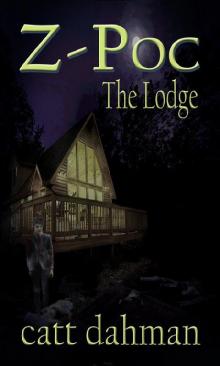 Z Poc: The Lodge
Z Poc: The Lodge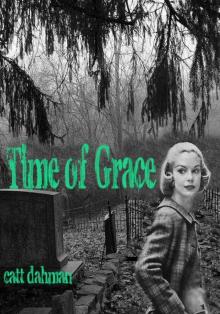 Time of Grace
Time of Grace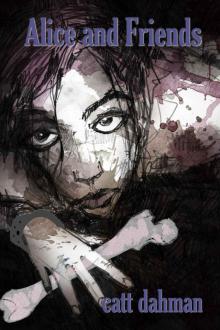 Alice and Friends
Alice and Friends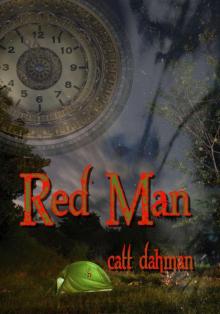 Red Man
Red Man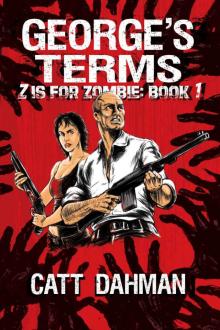 George's Terms: A Zombie Novel (Z Is For Zombie Book 1)
George's Terms: A Zombie Novel (Z Is For Zombie Book 1)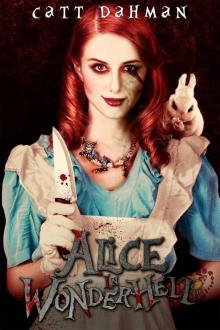 Alice In Wonderhell
Alice In Wonderhell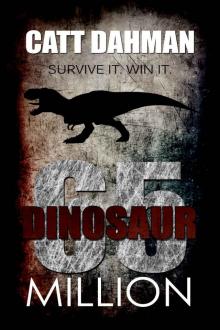 Dinosaur: 65 million
Dinosaur: 65 million Extinction Island 2
Extinction Island 2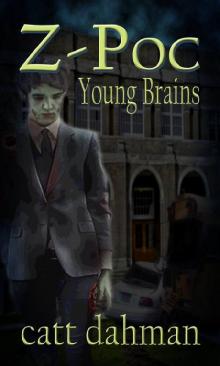 Z Poc: Young Brains
Z Poc: Young Brains Of Guilt and Innocence: Institute at the Criminally Insane (Virgil McLendon Thrillers Book 3)
Of Guilt and Innocence: Institute at the Criminally Insane (Virgil McLendon Thrillers Book 3)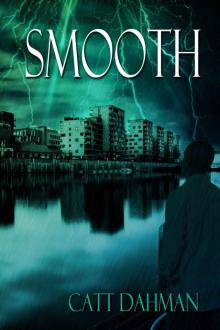 Smooth
Smooth Extinction Island
Extinction Island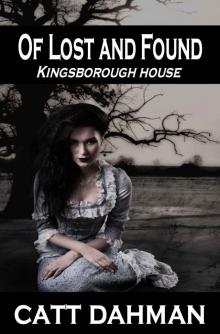 Of Lost and Found (the Kingsborough House): Kingsborough House (Virgil McLendon Thrillers Book 4)
Of Lost and Found (the Kingsborough House): Kingsborough House (Virgil McLendon Thrillers Book 4)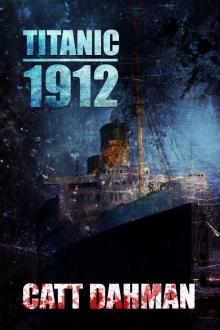 Titanic 1912: A Lovecraft Mythos Novel
Titanic 1912: A Lovecraft Mythos Novel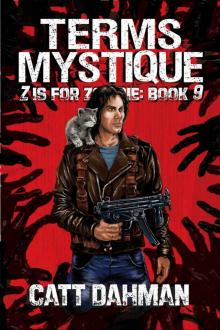 Terms Mystique: Z Is For Zombie 9
Terms Mystique: Z Is For Zombie 9 Wild Boys: Six Shooters and Fangs
Wild Boys: Six Shooters and Fangs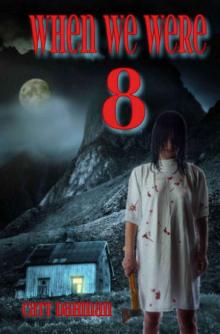 When We Were 8
When We Were 8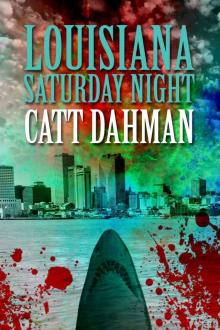 Louisiana Saturday Night
Louisiana Saturday Night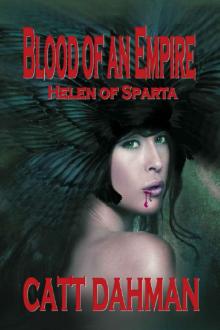 Blood of an Empire: Helen of Sparta
Blood of an Empire: Helen of Sparta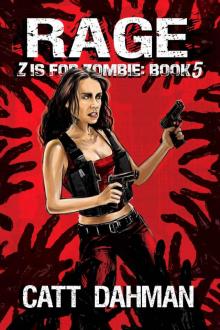 Rage: Z Is For Zombie Book 5
Rage: Z Is For Zombie Book 5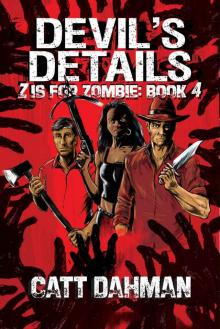 Devil's Details: Z Is For Zombie Book 4
Devil's Details: Z Is For Zombie Book 4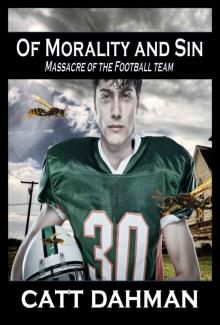 Of Morality and Sin: Massacre of the Football Team (Virgil McLendon Thrillers Book 7)
Of Morality and Sin: Massacre of the Football Team (Virgil McLendon Thrillers Book 7)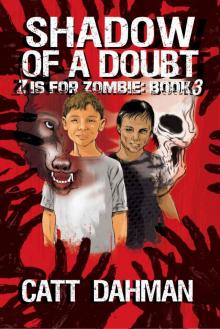 Shadow Of Doubt: Z Is For Zombie Book 3
Shadow Of Doubt: Z Is For Zombie Book 3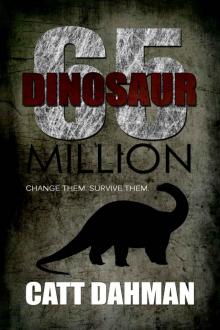 Dinosaur: 65 Million: Book 2 Change Them, Survive Them
Dinosaur: 65 Million: Book 2 Change Them, Survive Them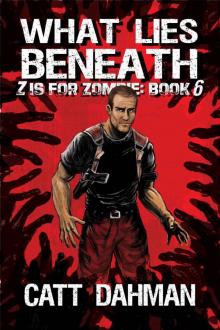 What Lies Beneath: Z is for Zombie Book 6
What Lies Beneath: Z is for Zombie Book 6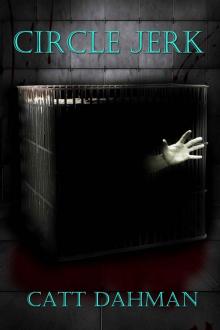 Circle Jerk
Circle Jerk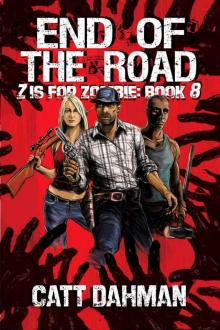 The End of the Road: Z is for Zombie Book 8 (Z is for Zombie: Book)
The End of the Road: Z is for Zombie Book 8 (Z is for Zombie: Book)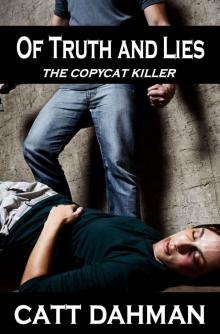 Of Truth and Lies: Hollingsworth Copycat Killer (Virgil McLendon Thrillers Book 5)
Of Truth and Lies: Hollingsworth Copycat Killer (Virgil McLendon Thrillers Book 5)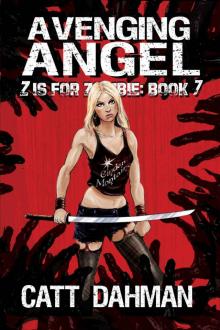 Avenging Angel: Z is for Zombie Book 7
Avenging Angel: Z is for Zombie Book 7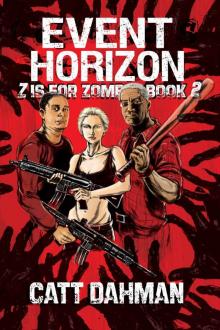 Event Horizon: Z Is For Zombie Book 2
Event Horizon: Z Is For Zombie Book 2 Of Blood and Water: Campground Murders (Virgil McLendon Thrillers Book 1)
Of Blood and Water: Campground Murders (Virgil McLendon Thrillers Book 1)